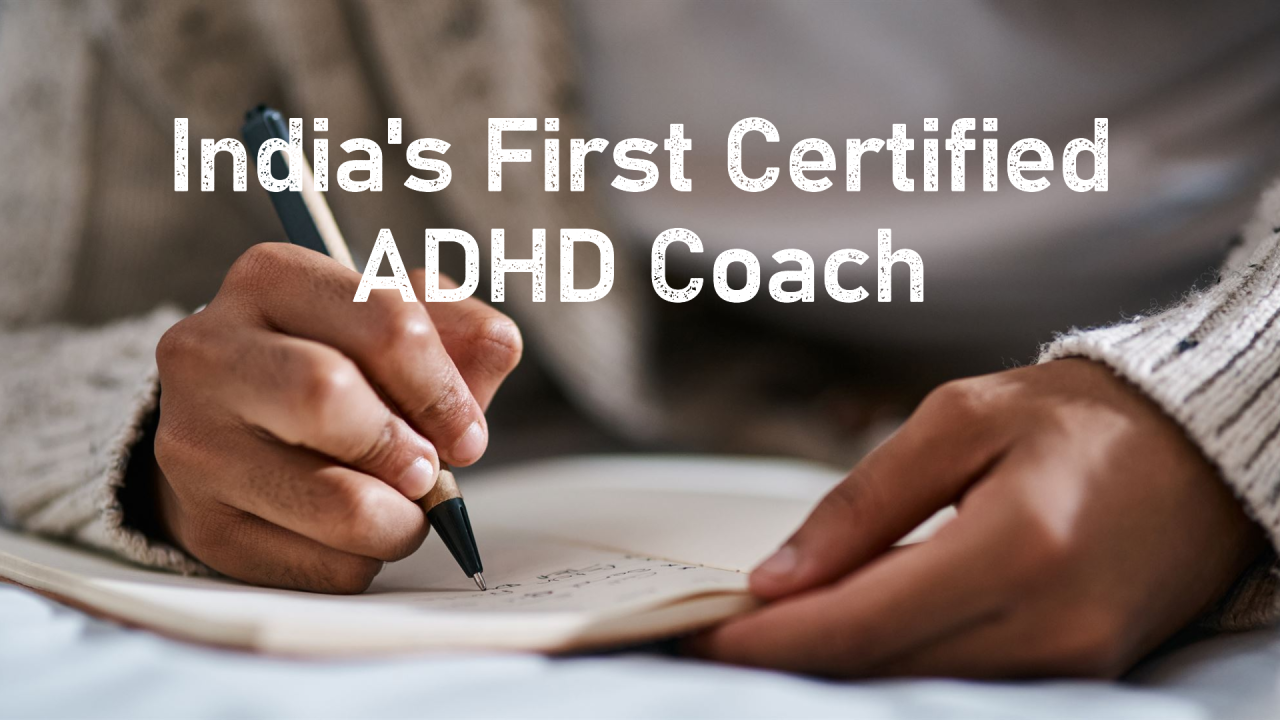
An interview with India's first ever certified ADHD Coach - Sonal Singh
Sonal Singh is pioneering a new path in India as the country’s first-ever certified ADHD coach. In a country where mental health and neurodiversity are still developing areas of awareness, Sonal has become a vital figure for those struggling with executive functioning challenges. Over the past five years, her work has filled a much-needed gap in a society that still holds many misconceptions about ADHD and its impact across students and adults navigating everyday life.
Sonal’s journey into ADHD coaching is both personal and driven by compassion. It started when someone close to her struggled with ADHD, particularly with executive functioning. Sonal sought help from various specialists in India but quickly realised that even professionals lacked a clear understanding of the condition. “To my shock, many of the specialists I was accessing didn’t really understand the intricacies of ADHD or Executive Function Skills,” she recalls. The lack of knowledge prompted her to take matters into her own hands. As she delved deeper into studying ADHD, Sonal made a significant discovery—she herself had ADHD, and went to seek a diagnosis. This revelation only fuelled her determination. Today, she applies the same strategies she teaches to her clients in her own life, underscoring the importance of setting boundaries and creating structured routines to succeed.
A typical day for Sonal begins with some self-care, something she has learned is essential to maintaining her energy for coaching. After taking a walk or spending time with her family, she moves into a mix of new client consultation calls and coaching sessions. Her clients range from children struggling in school to adults grappling with ADHD’s challenges in their personal and professional lives. Each coaching session is unique, tailored to the individual needs of her clients. Some people come to her feeling stuck, unable to move forward with tasks, while others struggle with organisation and time management. Sonal works with them to create systems that play to their strengths while addressing their weaknesses. “It’s not just about good intentions,” she explains, “but about accountability and support.” One of her key goals is to help her clients find meaning behind their tasks and understand the cost of not completing them. This, she believes, helps with motivation and follow-through.
For new clients, Sonal starts by mapping out their ADHD traits and identifying their coping mechanisms. This initial phase involves listening closely to how they’ve managed to juggle tasks so far, recognising what they have done well, and finding patterns in their behaviours. She uses these traits to help clients build structures that suit their individual needs. The process of building trust and understanding is critical, and Sonal emphasises that coaching is not a one-size-fits-all solution. Every person’s ADHD manifests differently, and her job is to work with them to find what works best.
Working with both children and adults, Sonal has developed distinct approaches for each group. When coaching children, she keeps sessions short—usually around 25 minutes—because they have lower attention spans for long discussions. Most of the time, the focus is on practical academic planning, such as organising study routines and preparing for exams. However, she notes that coaching only works if the children themselves are motivated to participate. “If the acceptance isn’t there from the student, the coaching won’t work, even if the parents are on board,” she explains. For adults, the sessions are more about self-awareness. Many adults come to her after realising they need help managing their ADHD symptoms. Sonal works with them to understand how their ADHD affects their daily lives and helps them build strategies to overcome these challenges. Her ultimate goal is to equip adults with the tools to coach themselves, fostering independence and confidence in managing their ADHD.
Sonal has faced several challenges as one of India’s first ADHD coaches, particularly in terms of the overwhelming demand for her services. ADHD is still a misunderstood condition in India, especially when it comes to adults. Many people didn’t even know what an ADHD coach was when she started, let alone grasp the importance of executive functioning. This lack of understanding creates a bottleneck in the system. While awareness is slowly growing, there simply aren’t enough professionals in India who specialise in ADHD, particularly adult ADHD. As a result, many people are misdiagnosed, sometimes with personality disorders, because clinicians don’t recognise the signs of ADHD in adults. Women, in particular, face unique challenges, as ADHD symptoms can be exacerbated by hormonal changes, something that is not widely understood.
Despite these hurdles, Sonal remains optimistic. She believes that her work is helping to create safe spaces for people to discuss their ADHD and seek the help they need. The hardest part, she says, is knowing that so many people need help and not being able to provide it to everyone. The demand is far greater than the supply, but Sonal is determined to continue making a difference in whatever way she can.
One of the things that keeps Sonal passionate about her work is seeing the progress her clients make. One success story that stands out is a client who had been struggling with task paralysis while working on her master’s thesis. Despite feeling like she was constantly making little to no progress, this client kept pushing forward with Sonal’s guidance. Eventually, not only did she complete her thesis, but it was upgraded to a PhD thesis! During a body-doubling session, where two people work side by side to stay focused, this client realised that she had been coaching her peers on how to stay on task—an incredible reflection of how far she had come since beginning ADHD coaching. These moments, where her clients experience true breakthroughs, reaffirm Sonal’s belief in the power of ADHD coaching.
A large part of Sonal’s work involves educating the public and her clients about ADHD and dismantling the many misconceptions surrounding the condition. One of the biggest myths she encounters is the belief that ADHD is tied to intelligence. “People often think children with ADHD are slow learners,” she says, “but their brains are actually working very fast; they just have trouble communicating how their brains work.” Another misconception is that ADHD only affects boys. Although awareness is slowly increasing, there is still a long way to go in educating the public about the prevalence of ADHD in girls and women.
For those interested in becoming ADHD coaches, Sonal has some valuable advice. She stresses the importance of finding a personal “why” for entering the field. “Don’t make it transactional,” she urges. “You need to want to make a difference.” While there is growing demand for ADHD coaches, Sonal advises aspiring coaches to be prepared to do some pro-bono work, especially at the start of their careers. It’s also essential to get proper training. Sonal recommends seeking out reputable coaching institutes and taking a deep-dive ADHD coaching course, rather than opting for surface-level programs. The process may be long, but Sonal assures that the results are well worth the effort.
Sonal Singh’s work as an ADHD coach is groundbreaking in many ways. Not only has she carved out a new space for ADHD coaching in India, but she’s also helping to shift the conversation around ADHD in the country. Her clients, both children and adults, are learning to manage their symptoms and lead more fulfilling lives thanks to her guidance. With each success story, Sonal is breaking down barriers and creating a more inclusive, supportive environment for those with ADHD in India.
